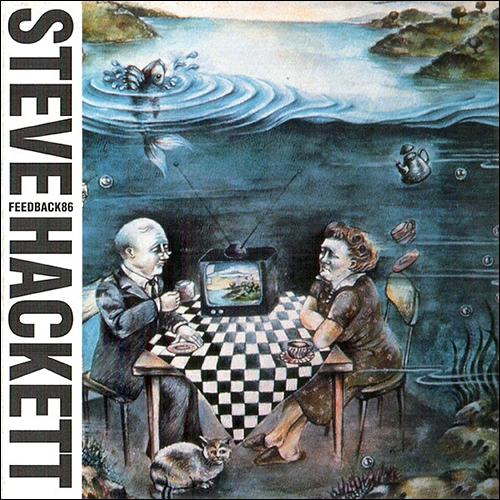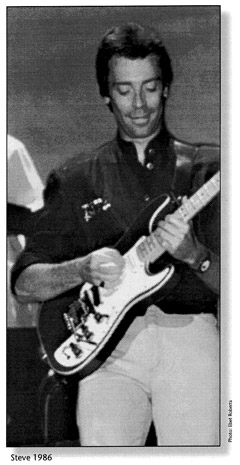- Article
- Read in 7 minutes
Steve Hackett – Feedback 86 – CD review
After the success the GTR album enjoyed in the mid-80s Steve Hackett planned to do another solo album that was to be called Feedback. It was never released, though parts of it found their way to the fans. Now Steve has completed and released it.
At a time when Steve Hackett enjoyed remarkable (also commercial) success with the GTR album and the accompanying tour in 1986 and 1987 he also wrote eight songs that were put together for his next solo album Feedback. GTR were signed to Arista, but Hackett was unable to find a record company as a solo artist. His contract with Charisma had run out with Highly Strung. Bay Of Kings and Till We Have Faces had come out on small labels as had his second acoustic album Momentum in 1988. Nobody wanted to release Feedback – despite musical compromises and despite the success of GTR. This was the state of things before a new management and other changes early in the 90s brought on a positive change in Steve’s career… By that time his music had gone off in a different direction, away from the 80s sound of Feedback, and thus the album remained unreleased.
Apart from the lack of interest from the record companies Steve has apparently also explained that the album was not released also because the songs he recorded for Feedback were not homogenous and did not fit together very well; he went on to say that he had used all the interesting ideas from Feedback on later recordings. Today Steve thinks that the record labels probably simply thought he was too old; in fact he himself thought his career was over at 35, with no idea how things would change in the following decade. Now that Steve has Camino Records, his own record label, it is easier for him to bring out his material, and so it fits well into the current wave of nostalgia in the Genesis camp that Feedback has now finally been released as Feedback 86 – one of the special treats Steve and his management offer his fans.

The eight tracks of the CD are not all new material for many a fan, because over the years several tapes have come into circulation that contain studio outtakes from the Feedback sessions (albeit in doubtful audio quality). These tapes remain interesting because they also offer alternate versions for some songs that are quite worth while listening to. The infamous Highland label has released such a tape as a bootleg CD (Oh! How I Love You, HL469). Some songs have also been released or used (at least parts of them) in other songs.
The core of the band consists of Steve, his old trusted keyboarder and drum programmer Nick Magnus, the singer Chris Thompson (former singer of Manfred Mann who was followed in that capacity by Noel “Smallcreep’s Voice” McCalla, who sang on Mike Rutherford’s first solo album). It is augmented by a handful of guest musicians. Most of the songs were written and produced by Steve Hackett.
The first song is Cassandra. The pop-oriented makeup was a potential lure for record deals. The repetitive guitar motive is both catchy and memorable; initially verses and chorus (with Steve’s voice) alternate until the only lyrics that remain in the second half of the song are the cries for “Cassandra”; then Steve and Brian May’s electric guitars make solo appearances, like a dialogue rather than a battle.
The lyrics are about predictions of bad luck: Cassandra was the daughter of king Priam of Troy who foretold the destruction of the town. Nobody believed her, though, and she suffered much from it. The curse of clairvoyance is the topic of Cassandra. This song features not only Brian May but also Ian Mosley (drums) and Pete Trewavas (bass) of Marillion. Ian, an old friend of Steve’s, had already worked on Highly Strung. Cassandra was a bonus track on the US version of Guitar Noir, albeit in a later recording where Steve sings along and with a brief instrumental part that has a machine-like rhythm. The Highland bootleg has another shorter version with fewer instruments and less echo.
Prizefighters is an song about heroic boxers Steve wrote with Steve Howe for GTR. GTR did not record the song because they did not produce a second album, but they played it live and that is why it is on the GTR live album from the King Biscuit Flower Hour. At Kim Poor’s suggestion they had two singers on the studio version of Prizefighters, Chris Thompson and Bonnie Tyler (who also participated in Steve’s 1990 Rock Against Repatriation project). It is easy to imagine the chorus in a stadium full of people waving their lighters. The fretless bass plays collaparte during a guitar solo (i.e. it plays the same as the guitar, only an octave lower) until the guitar part begins to vary; the solo is followed by the song’s bridge over a syncopated rhythm that is driven by the bass drum. In an interview Steve admitted that these days he would never have written Prizefighter and Cassandra like this or indeed at all. MaxBacon did not manage to recreate the contrast between the gentle verses (“Every day a little harder…”) and the heroic chorus in the live version.
The instrumental solo in GTR consists of the Slot Machine riff. There is an unofficial version of the song where Thompson sing alone, and the instrumental bits are slightly different. Slot Machine was both written and produced by Steve Hackett and Brian May. It is a typical ‘80s song with wild guitar solos and still something special because there are many special sounds in the song produced by several effect devices – do these fit the title or was it the other way round? The fast and loud song is embedded into a dancehall scenario: There is a Vienna Waltz by Johann Strauss in the beginning, a gent asks a lady for the dance, and suddenly the guitar intro begins, which, incidentally, resembles the intro to Vampyre With A Healthy Appetite (from Guitar
Noir). The verses are in minor, the choruses in major. At the end of the song the lady observes that – because of the wild dance? – her dress is torn. Lyrics and music are about the addictive qualities of slot machines. Steve knows Brian May since he met Queen after their performance at Rock In Rio ca. 1985, and when GTR was over he even considered putting together a similar project with Brian. Outtake tapes have an alternate version with very interesting bits in the instrumental bridge that unfortunately were not used for the album version.
Stadiums Of The Damned is a piece that has been previously released on the Till We Have Faces re-release. The title was taken from a Bob Dylan line; the song was inspired by a Dostoyevski novel (Guilt And Punishment) where a woman forgives the murder of her uncle and becomes attracted to him. Steve has transferred this plot to soccer hooligans. The (sampled) brass part at the beginning reminds Steve of Richard Wagner; he considers reusing it in the future, perhaps when he works with an orchestra. The wood wind motive near the end is quite interesting because it is neither in major nor minor but in Lydian. Don’t Fall is an unreleased song, but Steve has already plundered it. The Unauthorised Biography compilation contained a song called Don’t Fall Away From Me with lyrics by Brian May that is quite related to this song. Brian may also use it again. Steve has also released it with a different chorus and other lyrics as Solid Ground on Blues With A Feeling. The Feedback version is interesting because of the mouth organ intro, a howling like a steam train with mouth organ improvisations. The guitar solo in the middle of the song has a gentle tune while another solo near the end is more extroverted. There is an unofficial shorter version where a harder riff accompanied by semiquavers from the bass which makes the whole thing more effective.

Oh How I Love You is quieter. Thompson sings this very emotional ballad. An instrumental version of this has already been released on the acoustic live album There Are Many Sides To The Night. The mandatory solo on the acoustic guitar is not left out, of course.
Notre Dame Des Fleurs was played on the 1988 Momentum tour. Both song title and music have sacral overtones, though the title is actually lifted from a book on which Jean Genet reports about his experience with homosexuality in prison. As far as style is concerned Notre Dame… continues the tremolo playing Steve had established with Black Light. Notre Dame has more depth and is more complex, though. Contrary to the claim on the Highland bootleg this is not the same song as Beja Flor from Steve’s live album that we mentioned above. After a transitional guitar run The Gulf continues attacca, i.e. without a break. Apart from a few changes in the instrumental this is the same version that is on Till We Have Faces. The chronology shows that this is not the 1990/91 Gulf War but the first one in the late 70s and early 80s: Steve recalls a crisis in which both Ayatollah Khomeini and U.S. President Jimmy Carter prayed to God and came to completely different decisions.
With this the album ends. It is an interesting look back at a gap in Steve’s career, though it is a gap many fans knew to fill with unofficial material. Fans of 80s pop/rock music will enjoy it, prog rock fans may be surprised here and there or chuckle occasionally. The cover shows Kim Poor’s 1978 water colour painting for Blood On The Rooftops. The people on it are the same as on the Please Don’t Touch front cover. Interestingly, the screen (under water) shows the landscape above the water.
by Andreas Lauer
translated by Martin Klinkhardt
(some of the quotes and piece of information in the review were taken from an interview Alan Hewitt conducted with Steve Hackett in fall 2000)

